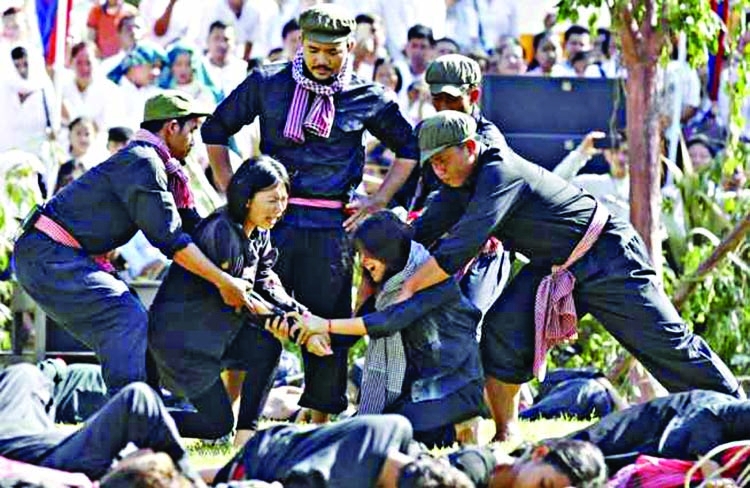Cambodia marks genocide atrocities

Black-clad students reenacted the horrors of the Cambodian genocide at the "Killing Fields" on Monday to commemorate the two million people killed by the Khmer Rouge's murderous, Maoist regime.
Hundreds gathered at the notorious site in Phnom Penh to mark the annual Day of Remembrance with prayers and performances, including students wielding wooden rifles, knives and bamboo sticks in mock attacks. "We performed these scenes in order to remember the genocidal Pol Pot regime and the cruelty that Cambodian people suffered," Chhaem Khleuong, a fine art teacher who played a Khmer Rouge cadre, told AFP.
A quarter of Cambodia's population died under Pol Pot's Khmer Rouge regime, culled in mass killings or of starvation, forced labour or torture. His brutal reign came to an end in 1979, and the Khmer Rouge atrocities are still remembered at museums and sites dedicated to victims of the genocide.
The Day of Remembrance, more commonly called the "Day of Anger" in Cambodia, is held at the Choeung Ek "Killing Fields", where some 15,000 people were confined and sent to their deaths between 1975 and 1979.
It was an emotional day for many attendees, some who cried as students pretended to slit victims' throats, shoot them dead or subject them to waterboarding. "These views brought my feeling back to the Pol Pot era, the killing was heinous," said 62-year-old Chan Ren, who lost more than 10 relatives under the regime.
"Today, people attend the event to pray to the souls of people who were killed by the Khmer Rouge," she added. Several of the genocide's chief orchestrators have been tried by a UN- backed court, though critics say prosecutions have been too slow and many of the accused have died before facing trial.
In November, Khmer Rouge's former head of state Khieu Samphan and "Brother Number Two" Nuon Chea were found guilty of genocide and sentenced to life in prison. Pol Pot, nicknamed "Brother Number One", died in 1998 before he was brought to trial.
